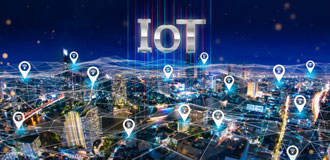Change is hard but resisting it is even harder. Logistics is all set to roll for transforming its business models since the industry understands that it cannot afford to postpone the move towards digitalization. Early adopters and innovative companies are fairly capitalizing on it to increase its efficiency, sustainability, and lower down costs; however, the traditional players will have to harness the power of technology, to maintain their value and competitiveness.
Managing logistics is quite tricky due to the global presence of the companies, which brings in a considerable amount of complexities that can be addressed with the help of digitalization which is into its full swing. The growing shift towards technology is driven by consumer demand and scalability that fosters the companies to set ambitious revenue targets. Changing customer expectations, new shopping patterns, and customers becoming digital long before the retailers are forcing the industry to adopt 'total retail', the model across bricks and mortar, online mobile, and other distribution channels.
Emerging Transportation Trends 2020
The technology definitely promises great things for the logistics industry across the world. From beating the competition to scaling matters it covers all to provide sustainable solutions. The future of the logistics industry is based on carving out ways to exploit the technology. The key emerging logistics trends2020 that shape the industry in its own way includes:

Cloud Logistics- Silver lining in the logistic's cloud
Cloud Logistics is one of the most popular logistics industry trends that is helping the industry to address the key challenges of scalability, data sharing, and price transparency. The increasing popularity of cloud-powered supply chains has led to increased efficiency in business models. It controls the global inventory levels and location of shipment and assets thereby enabling more control.
Blockchain enhancing collaboration and transparency

The logistics industry is more vulnerable to trade barriers due to its global presence, the decentralized and distributed database system of Blockchain technology helps to develop faster and leaner logistics system and automating the commercial processes of the industry.
Robotics Process Automation(RPA), Hyperautomation (ML), Artificial Intelligence(AI), and Augmented Reality (AR)driving the operational efficiency
The immense potential of these technologies will drive operational efficiency from warehousing to transportation and deliveries, thereby improving the quality and performance of the workforce. Data collected via RFID will enhance the value chain of logistics.
3D Printing encouraging the customization opportunities
3D printing technology will help the logistics industry by bringing products closer to the point of use thereby reducing the time and cost significantly. Also, 3D printers will allow hyper-personalization by making available the final configuration of the products.
Internet of Things(IoT)unleashing the immense opportunities

IoT is gearing its power in the virtual world of logistics by connecting the warehouses, providing smarter transport solutions, making possible the last-mile deliveries, and enhancing real-time visibility to the consumers.
Virtual Reality(VR) and Digital Twins more than gaming
The technology helps to optimize the material flow and process monitoring that are important aspects of the logistics. It also enhances the inventory planning system by providing visualization for implementation.
Big Data Analytics solving biggest challenges

The big data analytics will help to optimize dynamic and real-time routes, enable smarter forecasting, anticipate shipping, and address supply chain risk management strategies by converting large-scale data volume into a useful asset.
Key Logistics Challenges
International integration is widely observed in the logistics industry, which opens the trading opportunities between countries, at the same time brings in many challenges that need to be cubed efficiently. Keenly considering the use of technology may help to address many of them. The logistics functions encounter various challenges listed below to keep up with the growing competition:
Changing customer expectations changing the game
The customers are expecting to keep themselves updated throughout the process, which is demanding the logistics industry to maintain a great amount of information, thorough knowledge of all components of the industry, and provide real-time feedback.
Discouraging silo structure in IT systems will not help anymore
The traditional approach of holding old technology will make the business ineffective; also, many companies are jumping on the digital bandwagon without fixing the problems in their existing business model, which will result in failure; therefore, an appropriate IT model is required to rejuvenate the core systems and bring in the effective digital transformation. The ongoing cyber threat, however, needs to be addressed.
Optimizing logistics cost is challenging
The logistics industry is under huge pressure to optimize its logistics costs without effect on service and performance levels. The industry, therefore, recognizes the use of technology to eliminate costly errors, provide value-added services, consolidate shipment, and take decisions based on data analytics.
Reverse logistics reversing the profitability goals
With growing e-commerce, the customers are increasingly returning the products they are dissatisfied with, which is requiring the companies to design robust reverse logistics strategies with the help of the 3PL system.
Inventory control and visibility making the monitoring difficult
The logistics industry has to track the inventory since it is in transportation for a longer time. The tracking and visibility are possible with the help of expensive tracking devices, which is increasing the cost and the additional threat of getting tampered is adding to the woes.
Compliance with regulations and legislations creating complexities
As the regulatory norms related to transportation change with the change in cities, states, and countries, the businesses catering to the global clientele find it difficult to keep up with the varying legislations and regulations; however, it is possible to overcome this challenge with the help of audit software.
The rising cost of technology is hampering the budget
The initial cost of installing and maintaining the technology is quite high, which is significantly impacting the budget. Also, technology is prone to obsolescence, thus upgrading it adds to another expense.
Fluctuating economic environment impacting the industry
The fluctuations in exchange rates and fuel prices add to the transportation costs of logistics. Also, inflation in the economy leads to higher costs and reduced profitability. The logistics industry is, therefore, finding it difficult to identify effective solutions to mitigate the issue of economic changes which is generally uncontrollable.
Based on the above discussion, it is evident that technology delivers insight today to create the values for tomorrow despite having many challenges. The ability to sense these issues, analyzing them, and responding appropriately will help the logistics industry to survive in this hyper-competitive world. Additionally, dynamic consumer behavior and evolving internal capabilities are making the industry wrestle for configuring their business models. Leveraging a combination of digital technologies can dramatically transform the logistics industry from the cost center to the opportunity center. The transformation journey may vary with the companies pursuing it; however, the key element is the inclusion of technology. Thus, casting aside the preconceived notions and infusing the right IT model is the way to survive.
Related Articles
Achieving Success Through Innovative Solutions
Transforming client businesses through state-of-the-art creativ





